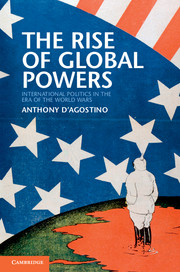Book contents
- Frontmatter
- Contents
- Maps
- Acknowledgements
- Introduction
- 1 The great powers at the dawn of world politics
- 2 Global origins of World War I: from the China scramble to the world crisis of 1904–1906
- 3 Global origins of World War I: a chain of revolutionary events across the world island
- 4 Balance and revolution, 1914–1918
- 5 A ragged peace, 1919
- 6 Scramble for Eurasia, 1919–1922
- 7 Drastic acts of unhappy powers, 1922–1923
- 8 Storms in the lull, 1924–1927
- 9 Politics and economics of the great slump, 1928–1933
- 10 A vogue for national economy
- 11 Mussolini’s moment, 1933–1935
- 12 The global civil war, 1936–1937
- 13 Last years of peace, 1937–1939
- 14 The European war, 1939–1941
- 15 The world war
- 16 Balance and hegemony
- Maps
- Notes
- Index
Introduction
Published online by Cambridge University Press: 05 June 2012
- Frontmatter
- Contents
- Maps
- Acknowledgements
- Introduction
- 1 The great powers at the dawn of world politics
- 2 Global origins of World War I: from the China scramble to the world crisis of 1904–1906
- 3 Global origins of World War I: a chain of revolutionary events across the world island
- 4 Balance and revolution, 1914–1918
- 5 A ragged peace, 1919
- 6 Scramble for Eurasia, 1919–1922
- 7 Drastic acts of unhappy powers, 1922–1923
- 8 Storms in the lull, 1924–1927
- 9 Politics and economics of the great slump, 1928–1933
- 10 A vogue for national economy
- 11 Mussolini’s moment, 1933–1935
- 12 The global civil war, 1936–1937
- 13 Last years of peace, 1937–1939
- 14 The European war, 1939–1941
- 15 The world war
- 16 Balance and hegemony
- Maps
- Notes
- Index
Summary
Does a system of great powers, with which we have lived, arguably, for the past four centuries, necessarily imply a struggle for world primacy? Do great states merely hold onto what is theirs, or do they reach for more? Prince Alexander Mikhailovich Gorchakov, foreign minister to Tsar Alexander II, mentor and patron saint of Russian diplomatists from Mikhail Gorbachev to Vladimir Putin, once attempted to address this question by explaining the geographical expansion of the Russian state as the mechanism of a natural law. As he saw it, “The United States in America, France in Algeria, Holland in her colonies, England in India – all have been irresistibly forced, less by ambition than by imperious necessity, into this onward movement where the greatest difficulty is knowing where to stop.” Gorchakov wrote this in 1864, during the heyday of European imperialism, when it was assumed that any great state with an expanding economy would naturally increase its political and military sway to the farthest corners of the planet. This book seeks to explore the idea of an “imperious necessity” of forward movement in the foreign policy of the great powers to the extent that it was manifested in the first half of the twentieth century. It follows the story of the expansion of Europe coming up against its limits in the most violent conflicts and explosive social movements yet known to history, the two world wars, the Great Depression, and the Russian and Chinese revolutions.
It is no accident that each of these topics continues to fascinate historians, even beyond the fact that new materials and sources frequently to appear and inspire new ways of trying to make sense of them. Here I propose to consider this cluster of events, along with their various connections, in an attempt to bring some history to bear on current and recurrent perplexities in the discussion of international politics. My intention is not so much a retelling as a reexamination of the story of the era of the world wars, one with a broader scope than the usual diplomatic histories. Most accounts of the component topics have devoted their main attention to European great power politics, with Anglo-German relations as the centerpiece, usually leaving aside or marginalizing the United States, the Soviet Russia, and the Far East. Often World War I has been treated as coming out of the blue, in the phrase of Virginia Woolf, “like a rut in the road,” and World War II as a kind of elaborate prelude to the Cold War. The present reexamination seeks to widen the field of vision. From the spatial limits of a purely European great power politics it looks out to those of world politics. From the time limits of the 1914–45 period it considers the interface with nineteenth-century imperialism at one end and the impact of the world wars on the Cold War at the other.
- Type
- Chapter
- Information
- The Rise of Global PowersInternational Politics in the Era of the World Wars, pp. 1 - 7Publisher: Cambridge University PressPrint publication year: 2011



